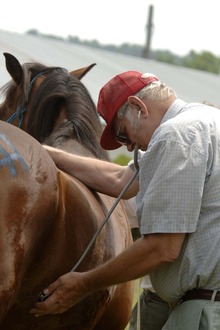In an article by Dr. Gregory C. Smith, owner of East County Large Animal Practice in El Cajon, California, featured on the AAEP website, the veterinarian discusses what a horse wellness program can accomplish for a horse owner wanting to make sure that nothing is missed in the day-to-day care that keeps a horse healthy.

Veterinarian listening to horse gut sounds
By developing a closer working relationship with your equine practitioner, you take advantage of the 'inside scoop' as the two of you work together to design a comprehensive health care plan for your horse.
According to Dr. Smith, the veterinary community is among the first in the industry to learn about advancements in health care as well as disease outbreaks, product complaints and other information that may affect how you care for your horse."
"By developing a closer working relationship with your equine practitioner, you take advantage of this “inside scoop” as the two of you work together to design a comprehensive health care plan for your horse."
Dr. Smith goes on to delineate the basic areas of horse health and how a wellness program effectively pulls together all areas of horse health maintenance.
A wellness program should have vaccinations, dewormers, dentistry and nutritional consultation as the cornerstone procedures. While that sounds simple and obvious, there is much controversy and change in each of these basic areas.
For example, veterinarians not too long ago were recommending that even foals from vaccinated mares begin receiving their own vaccinations within the first few months of birth.
On-going research has shown that antibodies from the mare’s milk for some diseases (such as influenza) MAY last much longer than originally thought. Therefore, the foal’s first vaccinations can be given much later (at eight or nine months of age for influenza if the mare was vaccinated).
With the introduction of worming medications, it is even more critical to plan for parasite control. Issues such as resistance, whether to use a daily dewormer or a purge dewormer, and the increasing importance of encysted small strongyles need to be considered as you and your veterinarian select products, schedule fecal examinations, and set up environmental control measures.
Dentistry in the horse has been transformed in the last decade or so to a science that helps keep your horse in good weight and good performance. This has become especially important as horses are living longer and longer.
The days of hand-floating every horse in the barn on one visit have given way to oral examinations and scheduling preventive and corrective dental procedures appropriate for your horse’s age and use.
Even if your horse is at his ideal weight, there’s still a benefit to showing your veterinarian what and how you’re feeding your horse. Not only will you have the opportunity to ask questions about nutrition and other topics during a tour of the feed shed and pasture, but you may also end up reducing the number of supplements you give your horse, thereby reducing your feed costs.
While all wellness programs also include a basic physical examination in addition to the services above, some veterinarians include other procedures and consultations with their packages based on the needs of the individual owner and horse.
Many veterinarians will alert you to the need for a visit or for a product to be administered, relieving you of detailed record keeping.
Most importantly, you can help keep the information highway from becoming bumper-to-bumper with confusion by developing a partnership with your local equine veterinarian.
